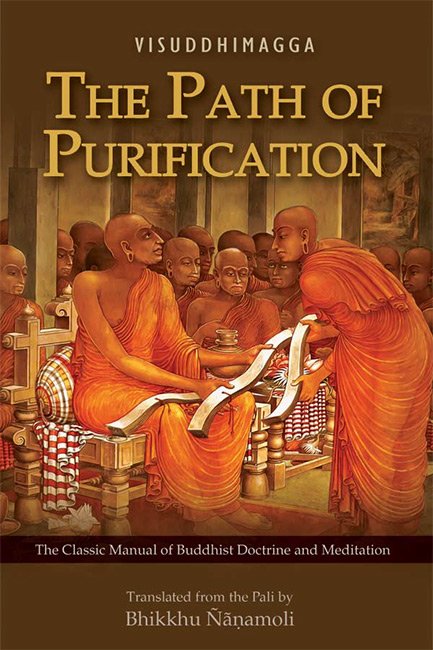Visuddhimagga (the pah of purification)
by Ñāṇamoli Bhikkhu | 1956 | 388,207 words | ISBN-10: 9552400236 | ISBN-13: 9789552400236
This page describes The Last Three Knowledges are One of the section Purification by Knowledge and Vision of the Way of Part 3 Understanding (Paññā) of the English translation of the Visuddhimagga (‘the path of purification’) which represents a detailled Buddhist meditation manual, covering all the essential teachings of Buddha as taught in the Pali Tipitaka. It was compiled Buddhaghosa around the 5th Century.
The Last Three Knowledges are One
79. This [knowledge of equanimity about formations] is the same in meaning as the two kinds that precede it. Hence the Ancients said: “This knowledge of equanimity about formations is one only and has three names. At the outset it has the name of knowledge of desire for deliverance. In the middle it has the name knowledge of reflection. At the end, when it has reached its culmination, it is called knowledge of equanimity about formations.”
80. “How is it that understanding of desire for deliverance, of reflection, and of composure is knowledge of the kinds of equanimity about formations? Understanding of desire for deliverance, of reflection, and composure [occupied with] arising is knowledge of equanimity about formations. Understanding of desire for deliverance, of reflection, and of composure [occupied with] occurrence … the sign … (etc., see §37) … with despair is knowledge of equanimity about formations” (Paṭis I 60f.).
81. Herein, the compound muñcitukamyatā-paṭisaṅkhā-santiṭṭhanā (“consisting in desire for deliverance, in reflection, and in composure”) should be resolved into muñcitukamyatā ca sā paṭisaṅkhā ca santiṭṭhanā ca. So [661] in the first stage it is desire to give up, the desire to be delivered from, arising, etc., in one who has become dispassionate by knowledge of dispassion that is desire for deliverance. It is reflection in the middle stage for the purpose of finding a means to deliverance that is reflection. It is equanimous onlooking in the end stage on being delivered that is composure. It is said with reference to this: “Arising is formations; he looks with equanimity on those formations; thus it is equanimity about formations” (Paṭis I 61), and so on. So this is only one kind of knowledge.
82. Furthermore, it may be understood that this is so from the following text; for this is said: “Desire for deliverance, and contemplation of reflection, and equanimity about formations: these things are one in meaning and only the letter is different” (Paṭis II 64).
